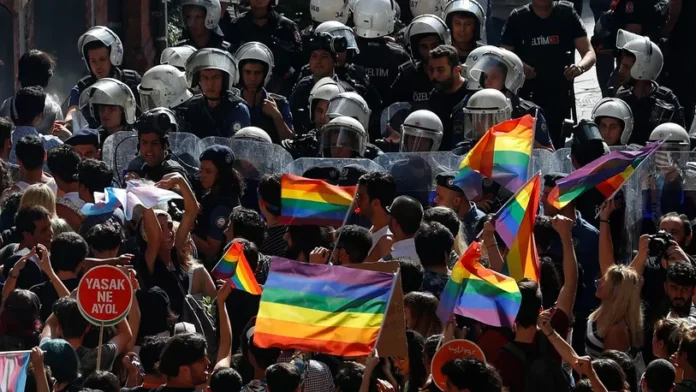Seventeen international press organizations have called on Turkey to remove provisions from a new judicial reform bill that would criminalize reporting on LGBTQ+ issues, warning that they pose a serious threat to freedom of expression and freedom of the press.
In a joint statement issued on Tuesday, the groups said the bill introduces a so-called “Turkish-style ban on homosexual propaganda,” punishable by up to three years in prison for any behavior or attitude that is “contrary to one’s biological sex and public morality,” as well as for praising, promoting or encouraging such behavior. The organizations added that the provisions are broader and vaguer than Russia’s 2013 ban, giving authorities wide discretion to target journalists and media outlets.
The groups warned that the provisions would curb LGBTQ+ people’s right to access and share information, turning coverage of rights violations, murders of transgender people, sexual health and pride marches into potential crimes under the pretext of “encouragement.”
The statement cited recent cases showing how LGBTQ+ reporting is already curtailed in Turkey, including the blocking of the website and social media accounts of KAOS GL, Turkey’s largest and oldest LGBTQ+ news platform, and the arrest of its editor-in-chief, Yıldız Tar. It also cited the prosecution of journalists who covered the banned Pride March in İstanbul in June, an investigation into reporter Can Öztürk after he reported on an academic claiming to conduct “conversion therapy” for LGBTQ+ children and fines imposed by Turkey’s broadcast regulator RTÜK on streaming platforms for airing LGBTQ+ content.
According to the organizations, the proposed law would escalate such violations further and criminalize reporting on LGBTQ+ issues.
The press freedom organizations that signed the joint statement were the Media and Law Studies Association (MLSA), the Dicle Fırat Journalists Association, the European Centre for Press and Media Freedom (ECPMF), the P24 Platform for Independent Journalism, the International Press Institute (IPI), the Contemporary Journalists’ Association (ÇGD), the Turkish Journalists Union (TGS), the European Federation of Journalists (EFJ), Osservatorio Balcani e Caucaso Transeuropa (OBCT), the International Federation of Journalists (IFJ), the Committee to Protect Journalists (CPJ), PEN International, the Foreign Media Association, PEN Norway, the Balkan Investigative Reporting Network (BIRN), the Media and Migration Association (MMA) and the DİSK Basın-İş Union.
Turkey’s ruling Justice and Development Party (AKP) has increasingly portrayed LGBTQ+ visibility as a threat to public morality and family values. Pride marches have been banned in major cities for years, and officials frequently describe LGBTQ+ advocacy as an attack on traditional norms. If enacted, the 11th Judicial Package would represent one of the most restrictive legal measures targeting LGBTQ+ individuals in Turkey in recent decades.
Homosexuality is not illegal in Turkey, but homophobia is widespread. It is common for Turkish President Recep Tayyip Erdoğan and other politicians from his party to attack LGBTQ+ individuals and accuse them of perversion and ruining family values.
Meanwhile, Turkey was ranked 47th among 49 countries as regards the human rights of LGBTQ+ people in the 2025 edition of the Rainbow Index released in May by the International Lesbian, Gay, Bisexual, Trans and Intersex Association (ILGA), which placed Turkey among the bottom five countries for LGBTQ+ rights in Europe.















